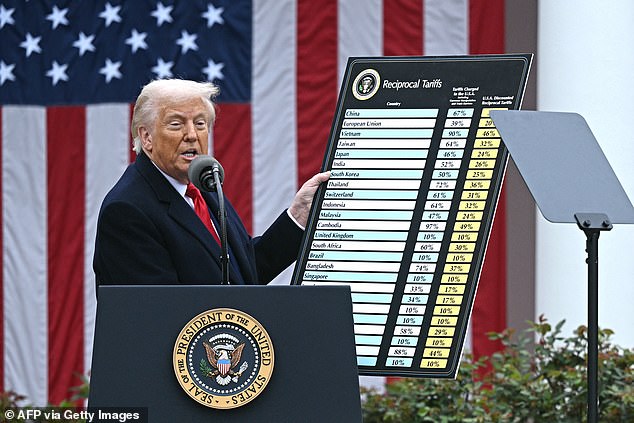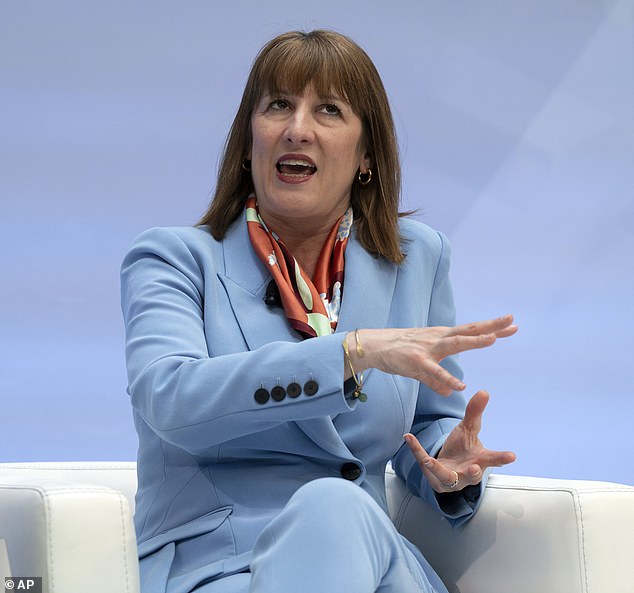At the City of London Regulators’ dinner at the Mansion House on Wednesday evening, a deputy governor of the Bank of England was positively lyrical about how the UK was faring almost six years after cutting ties with Brussels.
Sam Woods told the assembled financiers: ‘We have been able to admire the view from our position outside the EU and focus on seizing the opportunities which Brexit provides to make our regime a better fit for our market.’
How right he was. Claims that the City would be displaced as the financial hub of not just Europe, but much of the rest of the world have proved to be well wide of the mark.
Indeed, Britain’s exports of financial and professional services have blossomed as Brussels has descended into a bureaucratic quagmire.
Freed from the EU’s handcuffs, the UK has been able to secure the sort of trade agreements – with major powers such as the US and India – which have so far eluded the EU.
Rachel Reeves is engaged in a desperate search for scapegoats to explain away the Government’s dismal handling of the economy in the 16 months since Labour took office, writes Alex Brummer
And we have, of course, negotiated the lowest US tariff rate of any country that has struck a deal with that born-again protectionist Donald Trump: 10 per cent, compared to the EU’s 15 per cent.
But there was no sign of the Chancellor Rachel Reeves celebrating these achievements at the International Monetary Fund (IMF) meeting in Washington last week. Quite the opposite. In both her private and public conversations, Reeves was spitting tacks about Brexit. Her frustration stemmed from revisions that the Office for Budget Responsibility (OBR) is making to forecasts about productivity and growth.
‘The productivity challenge,’ she told fellow finance ministers from across the globe, ‘has been compounded by the way in which the UK left the EU.’
The truth is that the Chancellor is engaged in a desperate search for scapegoats to explain away the Government’s dismal handling of the economy in the 16 months since Labour took office.
And the blame game is intensifying as the clock ticks away the minutes until her second tax-and-spend Budget on November 26.
She is determined to spin the message that it is Brexit, not her own incompetence, that has brought the country to its knees, with sclerotic growth and the highest inflation rate in the G7 group of advanced Western economies. Not to mention a £30-£40billion black hole in the public accounts that she will have to find some way of plugging.
By reviving a dead cause, which received barely a mention in the 2024 Labour election campaign, she is seeking to stymie the rise and rise of Reform by accusing its leader Nigel Farage, the ultimate architect of the UK’s divorce from the EU, of a colossal miscalculation. But seeking to capitalise on the ‘Remainer’ case is, quite frankly, ridiculous.
Almost ten years have passed since the then-IMF managing director Christine Lagarde, now president of the European
Central Bank, warned that Britain’s departure from the EU would have ‘pretty bad, to very, very bad consequences’.
It is true that Brexit has coincided with a series of economic shocks. But these were due to the pandemic, the Ukraine war and, most recently, ‘Liberation Day’, when Trump embarked on his trade war with the rest of the world.

Deputy Bank of England governor Sam Woods said: ‘We have been able to admire the view from our position outside the EU and focus on seizing the opportunities which Brexit provides to make our regime a better fit for our market’
Reeves and Keir Starmer will need to engage in some impressively athletic intellectual somersaults if they are to reconcile their claims that, on the one hand, UK trade deals are reason for the OBR to be kinder in its economic forecasting, while claiming on the other that Brexit was harmful.
As we have seen, one statistic that Reeves is relying on heavily to support her new-found demonising of Brexit relates to Britain’s lagging productivity.
In debating Brexit, many political commentators still rely heavily upon an inaccurately reported OBR assertion from April 2023 that Brexit is responsible for a 4 per cent loss of productivity.
This, however, is a distortion of the Budget watchdog’s actual prediction. The 4 per cent loss of productivity, if it happens, would take place over 15 years. When it comes to economic forecasting, the accuracy of such long-term predictions can be largely dismissed out of hand.
As the great early 20th century economist John Maynard Keynes once memorably observed: ‘In the long run we are all dead.’ The reality of the matter is that the UK’s productivity shortfall pre-dates the Brexit referendum in 2016 and our actual departure from the EU on January 31, 2020.
Jonathan Portes, professor of economics at King’s College in London, told the financial news service Bloomberg: ‘We can say for certain it isn’t just Brexit. The productivity slump clearly has not just been in the UK. Europe has been better, but not much.’
Perhaps surprisingly, given Mr Woods’ upbeat assessment of Brexit, Reeves received support in Washington from his boss, Bank of England governor Andrew Bailey.
Speaking to the G30 group of financial veterans, Bailey said that – as a public official – he took ‘no position on Brexit’.
However, he acknowledged that it was among the reasons why the Bank’s economic forecasts have been more negative than some others.
The governor may have felt he had no choice but to offer some limited support to the Chancellor, a former junior official at the Bank, at an overseas forum but I was nonetheless surprised by Bailey’s intervention.
In past conversations with me he has been upbeat about the UK and the City’s post-Brexit prospects, pointing to – among other things – Britain’s emergence as a global champion of financial technology, or fintech. The UK is home to the world’s fastest growing online banks, such as Revolut, the credit card and banking innovator Monzo and advice firm Nutmeg (now part of JP Morgan Chase).
These and other enterprising start-ups are transforming the financial landscape of the UK and the world.

Britain was able to negotiate a more favourable 10 per cent tariff with US President Donald Trump compared with the EU’s 15 per cent
Yes, some 35 firms have disappeared from the FTSE350 index of companies because of takeovers and the decision of company boards to switch share quotations to New York over the last year – but that is nothing to do with Brexit.
And as share prices in London have hit new peaks in recent weeks, the market for Initial Public Offerings (IPOs) – new company flotations – has revived.
Among the newcomers are the online bank Shawbrook, food supplier Princes and The Beauty Tech Group, all choosing London over New York and Amsterdam, which is a popular choice for European firms.
Meanwhile, the Mayfair area of London has consolidated its position as the leading location for private equity activity in Europe, with the giants of the industry Blackstone, CVC and KKR all with a big presence in the UK.
What’s more, the American hedge fund and investor Citadel, headed by high-profile billionaire Ken Griffin, is currently establishing an enormous new headquarters in the heart of the Square Mile. Far from damaging Britain’s financial sector, one of the nation’s biggest employers, Brexit has helped it boom.
The world’s biggest bank, JP Morgan, has been doubling down on its investment in the UK. Lloyd’s of London is in the process of re-establishing itself as the world’s premier insurance market, specialising in new risks such as climate change, sustainability and cyber crime.
And you don’t have to take my word for it.
Just listen to what the Lord Mayor of London had to say in his speech on Wednesday night.
‘If you want to insure against catastrophe, do it in London. If you want to raise debt or equity for your business, do it in London. If you want to fall out with your partners, sue them in London. And if you want your business to be increasingly sensibly regulated… base it in London.’
Obscure arguments about Brexit and productivity form part of the defensive wall which Starmer and Reeves are seeking to erect ahead of what can only be regarded as a humiliating second tax-hiking Budget.
The notion that we would be so much better off in Europe is an absurd fiction.
Escaping a stagnating, sclerotic EU was a huge tribute to the common sense of the British people. The Chancellor plainly thinks that in Brexit she has finally discovered a way of diverting attention away from her own shortcomings.
She could not be more wrong.
dailymail,debate,IMF,Brexit,Brussels,Rachel Reeves,London
#Rachel #Reeves #desperate #search #scapegoats #incompetence #target #ludicrous #ALEX #BRUMMER

